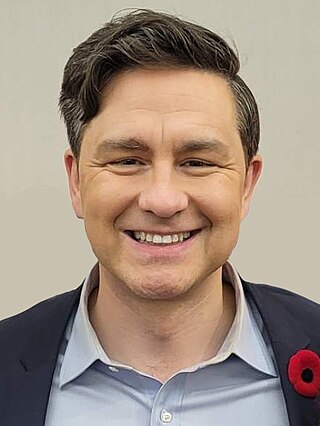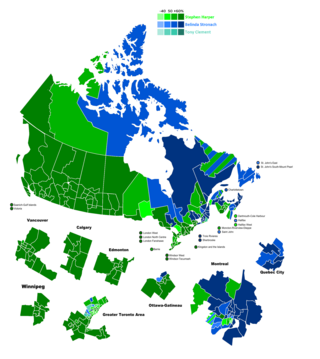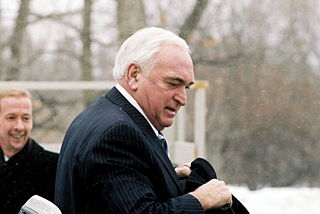
The Canadian Alliance, formally the Canadian Reform Conservative Alliance, was a centre-right to right-wing federal political party in Canada that existed under that name from 2000 to 2003. The Canadian Alliance was the new name of the Reform Party of Canada and inherited many of its populist policies, as well as its position as the Official Opposition in the House of Commons of Canada. The party supported policies that were both fiscally and socially conservative, seeking reduced government spending on social programs and reductions in taxation.

Charles Joseph Clark is a Canadian businessman, writer, and politician who served as the 16th prime minister of Canada from 1979 to 1980.

The Progressive Conservative Party of Canada was a centre to centre-right federal political party in Canada that existed from 1942 to 2003.

The Reform Party of Canada was a right-wing populist and conservative federal political party in Canada that existed under that name from 1987 to 2000. Reform was founded as a Western Canada-based protest movement that eventually became a populist conservative party, with strong Christian right influence and social conservative elements. It was initially motivated by the perceived need for democratic reforms and by profound Western Canadian discontent with the Progressive Conservative Party.

Stockwell Burt Day Jr. is a former Canadian politician who served as leader of the Canadian Alliance from 2000 to 2001 and later as a member of the Conservative Party of Canada.

The leader of the Official Opposition, formally known as the leader of His Majesty's Loyal Opposition, is the politician who leads the Official Opposition in Canada, typically the leader of the party possessing the most seats in the House of Commons that is not the governing party or part of the governing coalition.
André Bachand is a Canadian politician, who represented the riding of Richmond—Arthabaska as member of the Progressive Conservatives from 1997 to 2003.

Deborah Cleland Grey, is a retired Canadian member of Parliament from Alberta for the Reform Party of Canada, the Canadian Alliance, and the Conservative Party of Canada. She was the first female federal leader of the Opposition in Canadian history. She currently serves on the advisory board of the Leaders' Debates Commission.
The Unite the Right movement was a Canadian political movement which existed from around the mid-1990s to 2003. The movement came into being when it became clear that neither of Canada's two main right-of-centre political parties, the Reform Party of Canada/Canadian Alliance (CA) and the Progressive Conservative Party of Canada (PC), was independently capable of defeating the governing Liberal Party. The objective of the movement, therefore, was to merge the two parties into a single party. The goal of uniting the right was accomplished in December 2003 with the formation of the Conservative Party of Canada.

Charles Richard "Chuck" Strahl is a Canadian businessman and politician. He was a Member of Parliament from 1993 to 2011. First elected for the Reform Party, he was the leader of the Democratic Representative Caucus that left the Canadian Alliance in opposition to Stockwell Day's leadership. When the Conservatives won power in 2006, he became a prominent cabinet minister and served as Minister of Agriculture, Indian and Northern Affairs, and Transportation.

The 2004 Conservative Party of Canada leadership election took place on March 20, 2004, in Toronto, Ontario, and resulted in the election of Stephen Harper as the first leader of the new Conservative Party of Canada. The Conservative Party was formed by the merger of the Canadian Alliance and the Progressive Conservative Party of Canada, in December 2003.
Arthur Hanger is a Canadian politician.

Monte Kenton Solberg, is a Canadian businessman and politician. Solberg is a former Member of Parliament, representing the riding of Medicine Hat in the House of Commons of Canada as a member of the Conservative Party of Canada. He was the Minister of Citizenship and Immigration and later served as the Minister of Human Resources and Social Development. He has also served as Critic for Foreign Affairs, National Revenue, and Human Resources Development.

John Douglas Reynolds is a former Canadian politician. He was the member of Parliament for the riding of West Vancouver—Sunshine Coast—Sea to Sky Country in the House of Commons of Canada from 1997 to 2006 and a former Federal Opposition Leader. He had also been an MP in the 1970s as well as a provincial politician in British Columbia in the 1980s and 1990s.

The 37th Canadian Parliament was in session from January 29, 2001, until May 23, 2004. The membership was set by the 2000 federal election on November 27, 2000, and it changed only somewhat due to resignations and by-elections until it was dissolved prior to the 2004 election.
James K. Pankiw is a Canadian politician and former Member of Parliament.
Diane St-Jacques is a Canadian business person and former politician. St-Jacques served in the House of Commons of Canada from 1997 to 2004.
Richard M. Harris is a Canadian politician. He was a Member of Parliament from 1993 to 2015 and sat as a member of the Conservative Party of Canada. He was previously member of the Reform Party of Canada and the Canadian Alliance. From 2004 to 2015, he represented the electoral district of Cariboo—Prince George, and formerly represented Prince George–Bulkley Valley. He was first elected during the 1993 federal election and was re-elected in 1997, 2000, 2004, 2006, 2008 and 2011. He challenged Reform Party leader Preston Manning for leadership when Manning proposed merging the party with the Progressive Conservative Party of Canada. He later campaigned for Stockwell Day to become leader. The most prominent position he held with his party was Chief Opposition Whip from 2001 to 2002. He generated controversy when he appointed an unelected, Conservative Party member to represent a neighbouring electoral district in governmental affairs, though the electoral district had an elected Member of Parliament, but from an opposition party. In Fiscal Year 2009-10 he was the top spending Member of Parliament, and had the largest hospitality and lowest advertising expenditures of any house member.
Andy Burton is a Canadian politician. Burton immigrated with his family to Canada from England in 1952 at the age of 10. He grew up in Prince George, British Columbia. In the early 1960s, he worked as a highway surveyor and then as a bulk plant manager for Shell Petroleum. He began his small business in 1964, and operated it until he was elected to the House of Commons of Canada in the 2000 federal election as the Canadian Alliance Member of Parliament (MP) for Skeena riding.












